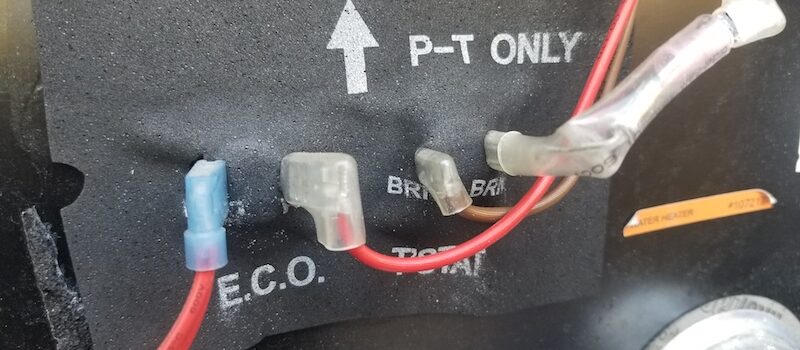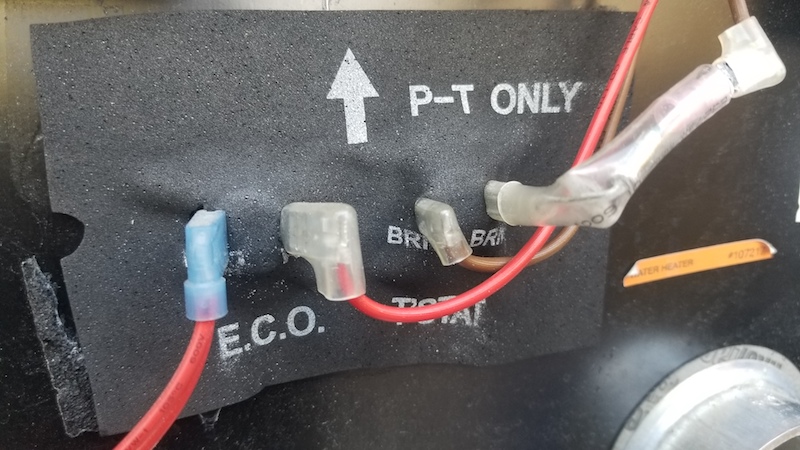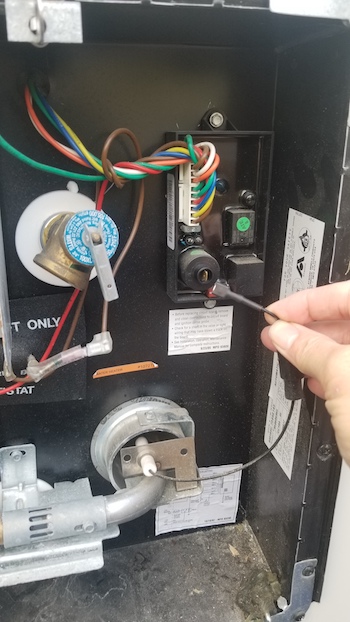
Atwood RV Water Heater Repair
A customer just called me about an RV water heating problem in Sonoma County, California. City power has just been switched off by PG&E due to high winds and low humidity causing a high wildfire risk.
Warning! See footnote about safety when working on or around RV water heaters.
> See our feature on water heaters and various tools available to service and repair RV water heaters.
The water heater in this unit usually works well using 120 volt power, but now the power is off, the propane will not operate. There is a clicking sound, but no flame.
My mobile RV service schedule offered the flexibility to be on-site almost immediately. I arrived in the town of Cloverdale, Ca., to an almost new Heartland fifthwheel to confirm the diagnosis and started the usual checks in the propane heating system of this Atwood RV water heater.
Diagnosis of the propane supply line showed good propane capacity in both cylinders, stovetop burners were working too, 12 volts was reaching the gas valve solenoids, which also functioned, and with a BBQ lighter, I was able to ignite the flame, although the flame did not persist.
The next step was checking the small fuse in the circuit board, and the propane electrode. Each proved good and while I had the propane burner disassembled, I checked the electrode spark gap for 1/8 inch and cleaned the burner assembly.

With all these items checked as working, the last remaining fault is now with the circuit board. While there was a clicking sound, this sound was coming from the solenoids. There was no clicking sound from the spark generating electrode or the coil on the circuit board.
Replacing the circuit board was easy and this resolved the problem. I was able to repair two other faults I found during operation. One was that the burner was very loud. This required a simple adjustment to the burner airflow and immediately gave clean and quieter burning of propane. Probably more efficient too.
The other fault was that the burner was switching on and off way too often. It should be hours between propane burns if the hot water is not being used. This indicated the thermostat may be faulty, so with it being a low priced part, I put in the new part and all is now working.

RV hot water systems require more preventive maintenance than the household versions. This is partly due to the compact and light-in-weight designs, so that RV owners can stay mobile, but also due to the exposed areas these systems are located. 
Annual maintenance should include:
- Inspecting the spark gap on the DSI (Direct Spark Ignition) electrode
- Check the condition of the spark electrode.
- Remove rusty scale and soot from the burn tube
- Check for propane leaks
- Check the temperature and pressure relief valve for various signs of ageing
- Cool the water in the tank, turn off all power and propane, and flush the tank
- Check and replace the anode rod in RV water heaters with a steel tank
- Run the system on both 120 volt electric and propane systems
Happy Campers RV Repairs will check your RV’s hot water service and keep you on the road with plenty of hot water.
Phone or text today … 707 346 0800
See our feature on water heaters and various tools available to service and repair RV water heaters.
Warning! There is a risk of burn, electric shock and pressure related injuries when working with on RV water heaters. There are also sharp metal pieces which may cause open-wound injury. Water pressure inside the water heater may cause projectile related injuries to eyes. Only proceed with RV water heater maintenance when it can be verified that there is no hot water inside the water heater and the town water pressure and RV fresh water pump pressure is shut off. Water heaters may operate with 120 volt AC electricity which is dangerous. It is recommended to consult a certified electrician or RV professional before attempting any work on or around an RV water heater. Internal water temperatures may reach near boiling temperature. Ensure the water in the water heater is cool before operating on the water heater. Either allow the water to cool over at least 12 hours with no power or propane supplied to the heater, or switch off all power and propane supply and run a hot water faucet for ten minutes to drain all hot water and replenish with cool water. Shut off town water supply and switch off the fresh water pump inside the RV so that there is no risk of projectile injuries from water pressure. Wear protective gloves and eye protection to avoid risk of skin injuries from sharp metal pieces.
2 Comments on “Atwood RV Water Heater Repair”
Vivian Black
Thank you for the warning you issued at the end of your excellent information on how to do a water heater repair in an RV. Worrying about burns, electric shock, and such is a little scary to us. We will take your recommendation to contact an RV professional. It is probably best to rely on them to repair this because they have the know-how and skills.
Alan ONeill
If you make sure that the water in the heater tank is completely cooled and that the water supply, including the fresh water pump is off, then you will be safer. Double check that the propane is also off, and the 120 volt power supply is shut down. These days, many RVs have solar and or inverters. So make sure the inverter is also switched off too. Or just call a tech as you mentioned.